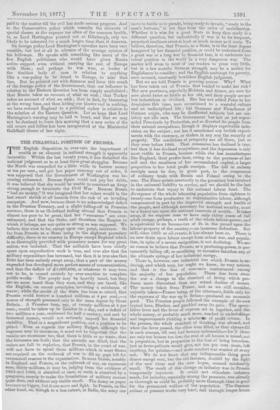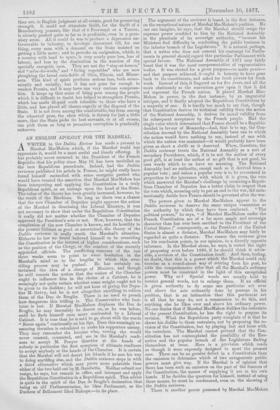THE FINANCIAL POSITION OF PRUSSIA.
THE English disposition to over-rate the importance of wealth as an element in national strength is apparently incurable. Within the last twenty years, it has disturbed the national judgment as to at least three great struggles. Because the North was compelled for a little while to borrow money at ten per cent., and got her paper currency out of order, it was supposed that , the Government of Washington was be- coming exhausted. Because Spain could not pay her debts, it was believed that she would be unable to construct an Army strong enough to terminate the Civil War. Because Russia. " had, no money," it was imagined that her rulers would in the last resort shrink at all hazards from the risk of an invading campaign. And now, because there is an acknowledged deficit in •the Prussian Treasury, and a slight falling-off in Prussian revenue, there is an ill-defined feeling abroad that Prussia is almost too poor to be great, that her " resources " are over- estimated, and that the State, and therefore the Empire to which it belongs, are not quite so strong as was supposed. We believe this view to be, except upon one point, incorrect. So
i
far from Prussia as a State being in the slightest pecuniary difficulty, there is no country in Europe except England which is so thoroughly provided with pecuniary means for any great action, war included. That the milliards have been chiefly spent upon unproductive work is true, and true also that the military expenditure has increased, but then it is true also that Debt has been entirely swept away, that a part of the money expended has developed more perfect means of communication, and that the deficit 'of £1,000,000, or whatever it may turn out to be, is caused entirely by over-exertion to complete public works. The people may be heavily taxed, but they are no more taxed than they were, and they are taxed, like the English, on •sound principles, involving a minimum of waste ; while the credit of the State has been so raised, that Prussia could borrow a hundred millions at 4 per cent.,—a source of strength possessed only in the same degree by Great Britain. A Prussian loan, say, of twenty millions at 4 per cent., would be taken up in London in a day, and a deficit of two millions a year, continued for half a century, and met by borrowed money, would not seriously imperil her financial, stability. That is a magnificent position, not a position to be pitied. Even as regards the military Budget, although the expenses may be enormous, it must not be forgotten that the results are.enormous too, that there is little or no waste, that the fortresses are built, that the arsenals are filled, that the cadres are full to repletion, that Prussia, in the event of war. will not have to spend those millions which in most States are required on the outbreak •of was to fill up gaps left for economical reasons in the organisation. In most States, notably in England and France, on the outbreak of war, an enormous, sum, thirty enillions, it may be, judging from the evidence of 1854 and 1860, is absorbed at once, as earth is absorbed by a quagmire, merely to make the foundations of military success quite firm, and without any visible result. The Army on paper becomes no bigger, but it can move and fight. In Prussia, on the other hand,'as, though to a less extent, in India, the army can
move to battle as to parade, being ready to invade, "ready to the men's buttons," in ten days from the order of mobilisation. Whether it is wise for a great State to keep thus ready is a different question, but undoubtedly if war is to be frequent, perpetual readiness saves at least as much money as it costs. To believe, therefore, that Prussia, as a State, is in the least degree hampered by her financial position, or could be restrained from a great war or a long war by financial fear, is to underrate her rulers' position in the world in a very dangerous way. The matter will seem to most of our readers to press very little, but in a few months German strength may be a matter for Englishmen to consider ; and the English contempt for poverty, once aroused, constantly bewilders English judgment.
But we are told Prussia is growing poorer. Why ? What has been taken out of Prussia that tended to make her rich ? Hor new provinces, especially Holstein and Alsace, are acre for acre about twice as fertile as her old, and their people are not less industrious or civilised. She has not added Poles to her dominions this time, men accustomed to a wasteful culture and an undisciplined life ; but Germans and Frenchmen of German origin, who may be disaffected subjects but are cer- tainly not idle ones. The Government has not as yet super- seded Free-trade by Protection, and so diverted its people from their natural occupations, though it displays regrettable inde- cision on the subject ; nor has it sanctioned any foolish experi- ments with the currency, or shaken in any way the security of property. The conditions of prosperity are all there, just as they were before 1864. That commerce has declined is true, but then it has declined everywhere, and the depression is only most visible in Prussia, because while she has manufactures like England, their profits bear, owing to the poorness 'of her soil and the smallness of her accumulated capital, a larger proportion to her total profit receipts. The fall in railway receipts must be due, iu great part, to the suspension of ordinary trade with Russia and Poland owing to the war. The Times points constantly to the pecuniary loss involved in the universal liability to service, and we should be the last to underrate that injury to the national labour fund. The divergence of the whole labouring population from eighteen to twenty-one from productive to unproductive labour, although compensated in part by the improved strength and health, of the people, and although necessary for national security, must be a heavy tax upon the national reservoir of wealth. It takes away, if we suppose man to have only thirty years of full adult energy, perhaps, a tenth of the whole labour-power, and is equivalent to an Income-tax of 2s. in the pound upon the labour-property of the country,—an immense deduction. But still, since 1863 at all events, it has always been so. There is no new drain upon labour except from actual war, and popula- tion, in spite of a severe emigration, is not declining. We see no reason to believe that Prussia, as a producing-power, is per- manently falling off, or sacrificing to excessive taxation any ,of the ultimate springs of her industrial energy.
There is, however, one industrial loss which Prussia is en- during, and which may, for aught we know, be very serious, and that is the loss of economic contentment among
the majority of her population. There has bean since the war a change in the standard of living which pro- duces more discontent than any actual decline of means. The money taken from France, and as we still consider,. at the uttermost, liable only
unjustly taken—France being, for the expenses of the war up to Sedan—produced no economic good. The Prussian people followed the example of its own i
typical hero, Blucher, and gambled away its gain. The specu- lative fever and the fever of expense set in together, :and the whole money, or probably much more, was lost in undertakings and improvements yielding a inimunibi of profit return. In the process, the whole standard of thinking was altered, and when -the fever passed, the cities were filled, as they always fill in such seasons, till rent had• become unbearable,--for -if there are only ten houses too few, the rent of all houses is raised, not in proportion, but in proportion to the fear of being housoless, just as fever-patients would give, not ten per cent. more, bin anything, for quinine,—and more comfort was wanted,of every
i sort. We do not know that any indispensable thing •grew dearer except rent, but the old incomes, studied by the light of the new ideas and the new hopes, seemed intolerably small. The result of this change on industry was in Prussia temporarily injurious. It could not stimulate industry much, for industry, especially among the peasants, was,already as thorough as could be, probably more thorough than is,good for the permanent welfare of the population. 'The .Garman artisan or peasant works very hard, and through longer lours
than are, in English judgment at all events, good for preserving strength. It could not stimulate thrift, for the thrift of a Brandenburg peasant, like that of a Provencal or a Tuscan, is already pushed quite as far as is profitable, even in a pecu- niary sense. All it could do was to produce a depression un- favourable to industry, to develope discontent till, for one thing, every man with a demand on the State insisted on getting a little more; and to provoke an emigration, which, in a country with land to spare, is very nearly pure loss, loss of labour, and loss by the diminution in the number of the specially energetic men. They are not the " stay-at-homes," and " ne er-do-weels," and "living vegetables" who are now ploughing the broad corn-fields of Ohio, Illinois, and Minne- sota. This kind of spirit produces serious loss, both econo- mically and socially, but it has not gone far enough to weaken Prussia, and it may have one very curious compensa- tion. It keeps up that sense of being poor among the people which it is difficult to doubt has helped to strengthen Prussia, which has made ill-paid work tolerable to those who have a little, and has placed all classes eagerly at the disposal of the State. It is not from among the comfortable, but from among the educated poor, the class which is thirsty for just a little more, that the State picks its best servants, or at all events, can pick them so long as pecuniary corruption is practically unknown.







































 Previous page
Previous page